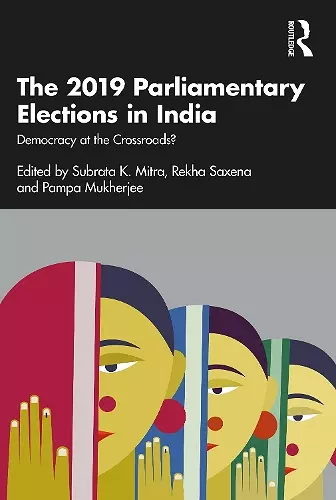The 2019 Parliamentary Elections in India
Democracy at the Crossroads?
Subrata K Mitra editor Rekha Saxena editor Pampa Mukherjee editor
Format:Paperback
Publisher:Taylor & Francis Ltd
Published:17th Jun '22
Currently unavailable, and unfortunately no date known when it will be back
This paperback is available in another edition too:
- Hardback£145.00(9781032184548)

This book presents a comprehensive overview of India’s electoral democracy and political system. It provides an in-depth analysis of the 2019 parliamentary elections to explore three crucial facts of India’s political life: the legitimacy of political competition as the only basis of power; elections as the only legitimate basis of political competition; and political parties as the only legitimate agency to conduct political competition. The book argues that the vitality and resilience of India’s electoral democracy remain high owing to large mass participation in elections that are competitive and relatively free and fair.
The volume includes key theoretical, empirical, and comparative perspectives on parties and elections from experts, and covers all major political parties of India, along with the performance of many representative regional parties. It discusses themes such as elections and party competition in India; ideology, interest, religion, and gender as they affect social mobilisation and political transaction; economic and politial change, and multiparty democracy; the dynamics of the Muslim vote; fluctuating electoral fortunes; and electoral campaigns and role of social media.
This book will be an essential read for scholars and researchers of political science, political sociology, election studies, Indian politics, South Asian politics, and South Asian studies. It will also interest those in politics, public policy and governance, civil society organisations, media and journalism, and the general reader.
‘This great collection of essays is a rich addition to the body of literature on India’s vibrant electoral democracy. It raises and answers questions like whether India’s democracy is at the crossroads, how resilient it is, how is the rise and decline of political parties affecting the trajectory of democracy and the regional dynamics. A compelling read.’
S. Y. Quraishi, Former Chief Election Commissioner of India
‘Compelling and persuasive analyses of party politics and voter support at both Union and regional levels reveal the remarkable transformations of Indian political cleavages extended by the 2019 parliamentary elections. The authors see, on balance, a deepening democratic engagement, but do not lose sight of the continuing challenges. Including the chapters on women, Muslims and on some of the regions adds depth to the book, as well as to the main argument.’
G. Bingham Powell, Jr., Emeritus Professor of Political Science, University of Rochester, author of Contemporary Democracies: Participation, Stability and Violence (1982), and former Managing editor, American Political Science Review
‘The book provides a panoramic view of vibrant Indian democracy. It draws attention to the mass participation in elections, which holds elected representatives accountable for their deeds, and responsive to popular needs. The complexity and intensity of Indian elections have kept political parties on tenterhooks, in nervous anticipation of electoral outcomes. In addition to dissecting the national impact of elections, the book brings out the salience of regions, gender, religion and leadership in ensuring the resilience and vitality of the democratic process. It proves that Indian democracy continues to be in fine fettle.’
Vinod Rai, Distinguished Visiting Research Fellow, Institute of South Asian Studies, (ISAS), Singapore, and former Comptroller and Auditor General of India
‘Subrata K Mitra, one of our foremost political scientists, and his co-editors Rekha Saxena and Pampa Mukherjee, have put together over a dozen chapters to explain why elections in India, intensely contested, aren’t a mere picture post-card – they are the beating heart of Indian democracy and its lifeblood as well. But what happens when elections, like in 2014 and 2019, bring in the most powerful single-party government in 30 years? Can voting protect institutions, strengthen checks and balances? The Parliamentary Elections of 2019 in India, Democracy at a Crossroads? stays away from any cliched, reflexive answers. Instead, it forces us to rethink the most vital question of them all: how do citizens and voters keep democracies vibrant and safe? Amid the sombre, funereal chants on the co-morbidities of democracy, comes this powerful voice of dissent – loud and clear and hopeful.’
Raj Kamal Jha, Chief Editor, The Indian Express
‘Central to any democracy is the belief in the ability of the voter to make rational choices in choosing governments. Prof Subrata Mitra and other contributors to this volume tell us how the vibrant relationship between citizens, parties and political institutions in India has been shaping its democracy. Their critical, balanced and objective analysis of India’s recent parliamentary elections dispel the notions of India’s democracy backsliding. They tell us about the resilience and consolidation of India’s democracy, its changing electorate and the party system, as well as the challenge of combining democracy and development.’
K.C. Suri, Professor, Central University of Hyderabad, Hyderabad, India
‘The title of latest volume assembled by the distinguished scholar, Subrata Kumar Mitra and his two colleagues, poses a profound question: The Parliamentary Elections of 2019 in India: Democracy at a Crossroads? This question is not only critical for India but also for much of democratic governance around the globe. The contributors to this volume give us an answer to this puzzle that I believe is utterly correct. India, has bounced back from challenges to good governance before and will do so again and exactly for the reasons the that volume states. Where there are well formed, solid institutions that promote and encourage competition, as there are in India, then when people feel their rights and freedoms might be in jeopardy, they turnout through the electoral process to preserve democracy and its enormous benefits for them. The people and institutions are the solid foundation of persistent democracy.’
Bruce Bueno de Mesquita, Julius Silver Professor of Politics, New York University and co-author of The Dictator’s Handbook
ISBN: 9781032198323
Dimensions: unknown
Weight: 453g
34 pages